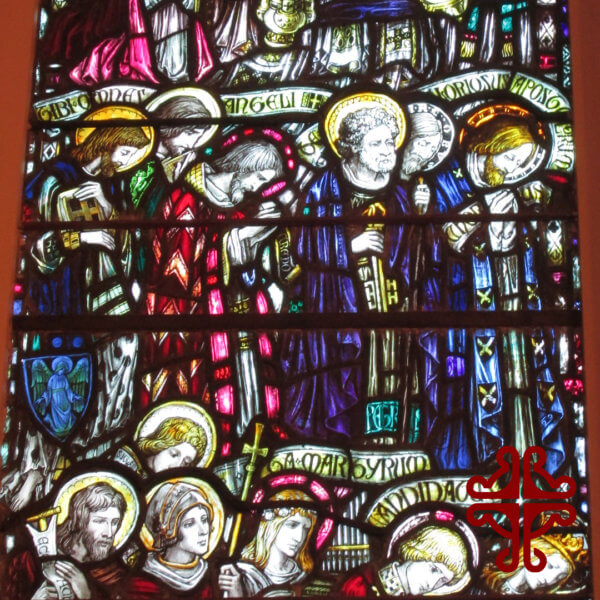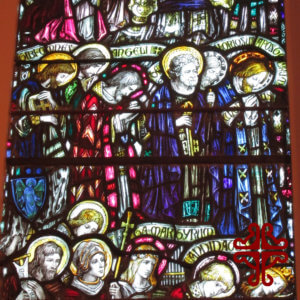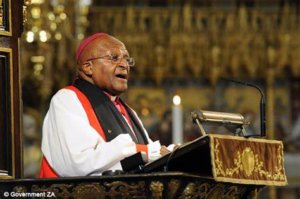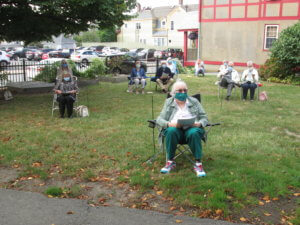
Ubuntu
 Our readings today are all about the importance — the essentiality — of living in community. God leads us into community. Our reading today from Genesis tells us of the fear of Joseph’s brothers when their father Jacob died. Remember, Joseph was the 11th of Jacob and Rachel’s 12 sons, and his father’s favorite, because he had been born to him in his old age. And BOY, did those brothers give him trouble.
Our readings today are all about the importance — the essentiality — of living in community. God leads us into community. Our reading today from Genesis tells us of the fear of Joseph’s brothers when their father Jacob died. Remember, Joseph was the 11th of Jacob and Rachel’s 12 sons, and his father’s favorite, because he had been born to him in his old age. And BOY, did those brothers give him trouble.
When he was young, they left him in a well. But God always worked through Joseph to bring the family — the community — back together. Then the brothers sold Joseph into slavery in Egypt, and God worked through Joseph to care for the Egyptians and his own people. In the part of Genesis that we read this morning, the brothers are afraid that Joseph will bring vengeance on them, but instead, God works through Joseph, speaking to them in kindness, reassurance, and mercy, bringing the family back together. This is God’s powerful push to draw us all together. We are not meant to live apart and in isolation, but in community. We are made fully human in community.
Ubuntu
Archbishop Desmond Tutu, the first black African Anglican bishop of Cape Town, South Africa, popularized the African word ubuntu in the Anglican Communion. I can’t think of a single English word that expresses the essential nature of community as well. In a speech at Morehouse Medical School in Atlanta many years ago, Archbishop Tutu described ubuntu as hospitality, as an open and welcoming attitude that is willing to share, to be generous and caring. Ubuntu is the development of the kind of character in a person who becomes a neighbor to a stranger and welcomes them as friends. Ubuntu creates the deep understanding in people that human existence is caught up in — and inextricably bound up with — God’s creation. And that a solitary human being is a contradiction in terms. Concluding his point in the speech, Archbishop Tutu said, I need other persons to become a person myself.
 And that’s what we see in our reading from Paul’s letter to the Roman community of Christians this morning. There are Jews among them, as well as Gentiles, so there are historical and cultural customs at issue, like what can we eat — and when. Paul’s message to the Roman Christians is not that their religious and cultural differences aren’t real, or that one tradition is better. What Paul tells the Roman Christians is that their relationships and mutual support are more important than any dietary law. That they need to value unity over unanimity. And being in right relationship over simply being right. And that their differences — the very things that seemed to divide them — were their assets in community. Their diversified portfolio of skills and gifts and perspectives that would help their community to grow and thrive.
And that’s what we see in our reading from Paul’s letter to the Roman community of Christians this morning. There are Jews among them, as well as Gentiles, so there are historical and cultural customs at issue, like what can we eat — and when. Paul’s message to the Roman Christians is not that their religious and cultural differences aren’t real, or that one tradition is better. What Paul tells the Roman Christians is that their relationships and mutual support are more important than any dietary law. That they need to value unity over unanimity. And being in right relationship over simply being right. And that their differences — the very things that seemed to divide them — were their assets in community. Their diversified portfolio of skills and gifts and perspectives that would help their community to grow and thrive.
Craig Kocher, associate dean of chapel and director of religious life at Duke, writes,
what makes us indispensable to one another, and what distinguishes Christians from the wider world, is not what we eat, or our ability to win a theological debate, or our moral superiority, or the utility of our practices, but our baptism, our unity in the gospel which demands that we remain with one another precisely in those places where we disagree.
Pastor Joann Lee writes, Living in community is hard. Church folks will not always agree. And we should disagree! Paul is subtly suggesting that places of friction — gracious friction — may in fact be the places that God is using to deepen our faith, widen our understanding, and bind us more closely together in Christ’s body.
And we need difference to survive even where we don’t have gracious friction. We need difference among us because different views represent different skills, backgrounds, and experiences that any community needs to survive and thrive. We also need difference among us just because ubuntu. We become fully human in the mix. We should pray for, hope for, work for — a variety of skills and gifts among us. And even better yet, a variety of views, backgrounds, and experiences.
Congregational Leadership Initiative
At Sunday’s service last week, you — or y’all, as my Georgia husband would say, commissioned your Congregational Leadership Initiative team: Deb Venancio, Dave Monroe, Valerie Martin, Vickie Hicks, and me. Your team spent the better part of this past week in a virtual workshop, meeting almost seven hours each day (with Zoom breaks) with a fascinating cohort of almost 50 clergy and leaders from the Episcopal Church Foundation and Episcopal churches all over the United States. Communities from New York to Texas, California to White Earth, Minnesota, and South Dakota to Rhode Island were represented in our group.
We were very different in location, church and community demographics, life experience, and physical facilities. But what we had in common was a deep love for our church and a commitment to our ministry. There was one church in Carlsbad, California that rented its worship space in an industrial park, creating physical plant costs of over $120,000 a year that limited their possibilities with mission in the community.
Another church on the West Coast had a preschool — more than 5 times the size of EDS. Their enrollment was down in COVID times, but the size of the preschool allowed them to continue operations, although with reduced staff. A historically black Episcopal church in Washington, D.C. faced serious deferred maintenance issues in their building as they watched their neighborhood gentrify and change around them. They were asking themselves who would carry on their church, and be the congregation, when their children were not churchgoers and their neighborhood didn’t look like them any more.
 What did we learn? Well, we learned that The Episcopal Church is full of parishes like ours — with about 40-50 people in the pews on a Sunday, single or part-time priests, and dedicated lay leaders who engage fully to nurture the church community. We learned that it’s time to be creative, and to think outside all of our traditional boxes.
What did we learn? Well, we learned that The Episcopal Church is full of parishes like ours — with about 40-50 people in the pews on a Sunday, single or part-time priests, and dedicated lay leaders who engage fully to nurture the church community. We learned that it’s time to be creative, and to think outside all of our traditional boxes.
All of the churches in the CLI program had rich assets, although few or none of those assets were traditional financial ones, such as a deep pledge base or big endowment. We learned that sometimes our assets are not what we’d think. What are our assets? Our connections with our community are assets. Our faith, our volunteers, our staff, our reputation in the community and the goodwill that comes with it are assets. And our building and grounds are assets. None of these things are traditional financial assets, but they are great riches to build — with God’s help — a beloved community — ubuntu. Amen
